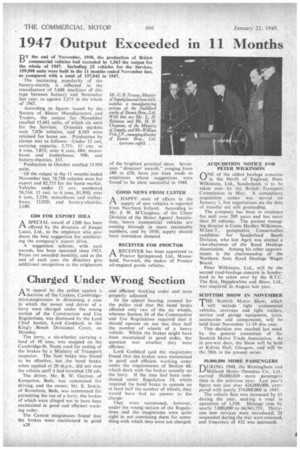Charged Under Wrong Section
Page 4

If you've noticed an error in this article please click here to report it so we can fix it.
AN appeal by the police against a decision of the Caxton, Cambridgeshire,magistrates in dismissing a case in which the owner and driver of a lorry were charged under the wrong section of the Construction and Use Regulations, was dismissed by the Lord Chief Justice, Lord Goddard, in the King's ..Bench Divisional Court, on Monday.
The lorry, a six-wheeler carrying a load of 10 tons, was stopped on the Cambridge-St. Neots road for testing of the brakes by a Ministry of Transport inspector. The foot brake was found to be effective, but the hand brake, when applied at 20 m.p.h., did not stop the vehicle until it had travelled 150 yds.
The driver, Mr. B. W. Gayton, of Kempston, Beds. was summoned for driving, and the owner, Mr. E. Inskip, of Bromham, Beds, was summoned for permitting the use of a lorry, the brakes of which were alleged not to have been maintained in good and efficient working order.
The Caxton magistrates found that the brakes were maintained in good A28 and efficient working order and were properly adjusted.
At the appeal hearing, counsel for the police said that the hand brake affected only two of the six wheels, whereas Section 34 of the Construction and Use Regulations required that it should operate on not less than half the number of wheels of a heavy vehicle. Whilst the brakes might have been maintained in good order, the question was whether they were efficient.
Lord Goddard said the magistrates found that the brakes were maintained in good and efficient working order under the requirements of Section 68, which dealt with the brakes actually on the lorry. If the men had been summoned under Regulation 34, which required the hand brake to operate on at least half the number of wheels, they would have had no answer to the charge.
They were summoned, however, under the wrong section of the Regulations and the magistrates were quite right in not convicting them for something with which they were not charged.




























